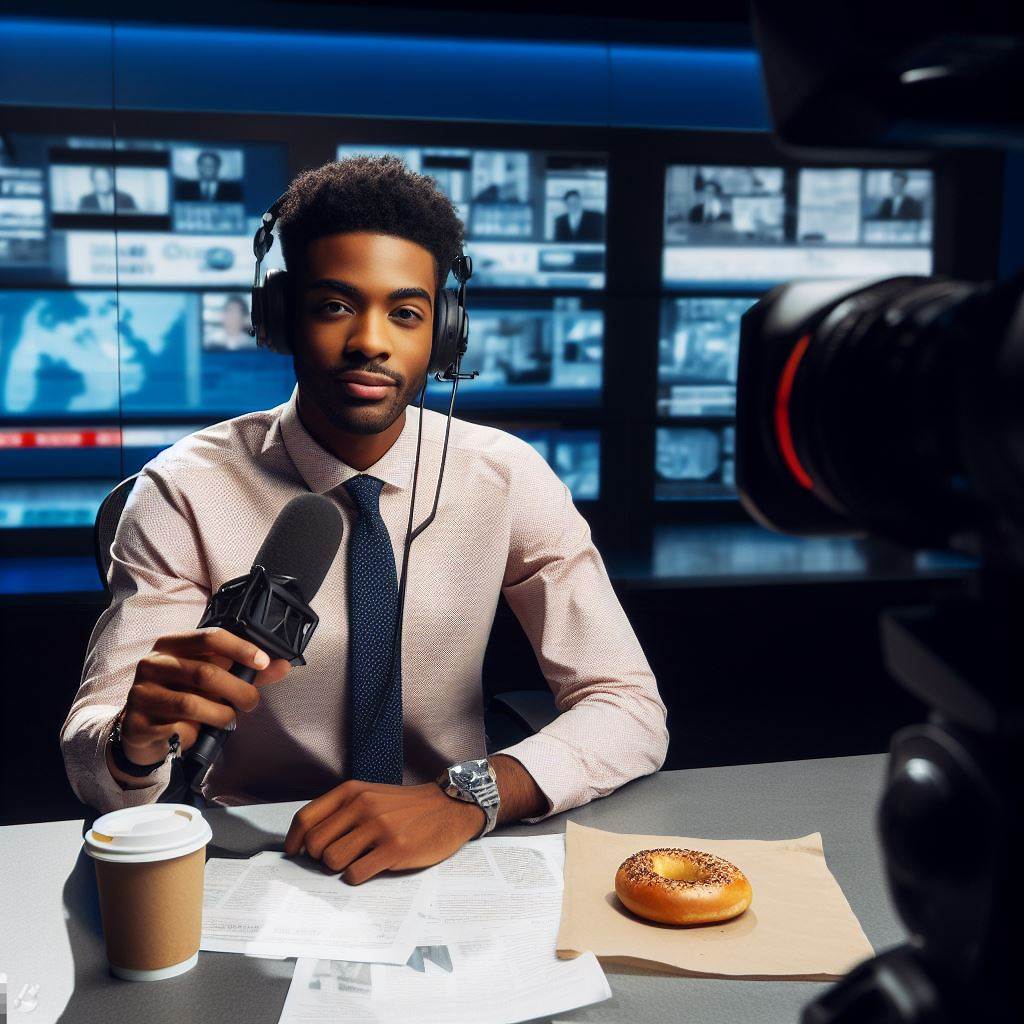Introduction
US broadcasters hold a prominent position in the history of broadcasting, shaping the industry with their talent, dedication, and innovation.
From radio to television, these individuals have made a lasting impact on the medium, captivating audiences and revolutionizing communication.
Their importance cannot be overstated as they have played a crucial role in informing, entertaining, and connecting people across the nation.
US broadcasters have been instrumental in breaking news, sharing stories, and shaping public opinion.
Their voices have served as a source of comfort during times of crisis, and they have been the conduits for transmitting cultural trends and values.
In this blog post, we will delve into the remarkable lives and legacies of famous US broadcasters.
We will highlight their groundbreaking achievements, memorable moments, and the challenges they faced.
Additionally, we will discuss the technological advancements that have transformed the broadcasting landscape and the role these broadcasters played in adapting to these changes.
Through exploring their stories and examining their contributions to the industry, we aim to celebrate the incredible impact of US broadcasters.
Their dedication and passion have not only shaped the broadcasting landscape but have also left an indelible mark on American culture.
Join us as we uncover the rich history and timeless legacy of these extraordinary individuals.
Early Pioneers in Broadcasting
First US broadcasters and their contribution to the field
- Guglielmo Marconi: Known for his pioneering work in wireless telegraphy, Marconi transmitted the first transatlantic radio signal in 1901.
- Reginald Fessenden: Acknowledged for the first audio broadcast in 1906, Fessenden introduced voice transmission via radio waves.
Early Challenges and Innovations in Broadcasting Technology
- Radio Broadcasting Development: The evolution from Morse code to voice transmission marked a significant milestone.
- Television Broadcasting Introduction: The advent of television transformed visual communication, revolutionizing information dissemination.
Early broadcasters encountered challenges
- Limited technology hampered transmission range and signal quality.
- Regulation issues arose due to unassigned frequencies and interference.
- Experimentation led to innovative antenna designs for improved signal reception.
- The quest for clearer audio and sharper visual transmissions spurred technological advancements.
These pioneers and their challenges paved the way for modern broadcasting:
- Their vision laid the foundation for the robust broadcasting industry today.
- Innovations in transmission technology expanded reach and improved broadcast quality.
- Early hurdles propelled regulatory measures, ensuring efficient spectrum allocation.
- Television’s advent brought visual storytelling, transforming entertainment and news dissemination.
In fact, Marconi and Fessenden revolutionized communication.
Their innovations overcame challenges, fueling technological advancements shaping today’s broadcasting landscape.
Read: The Rise of Podcasting: A New Era for US Broadcasters?
The Golden Age of Radio
Overview of the Rise of Radio Broadcasting in the US
During the early 20th century, radio broadcasting saw a tremendous rise in popularity in the United States.
Radio became a form of entertainment and communication that connected people across the nation.
It allowed for the dissemination of news, music, drama, and various other forms of programming.
Radio sets were gradually becoming a common household item, bringing the world into people’s living rooms.
Profiles of Famous Radio Broadcasters and Their Stories
1. Orson Welles – War of the Worlds Broadcast
One of the most famous radio broadcasts in history was Orson Welles’ production of “War of the Worlds.”
Airing on October 30, 1938, it caused panic and mass hysteria as listeners believed a real alien invasion was happening.
Welles’ innovative storytelling and use of simulated news reports showcased the power of radio as a medium.
2. Edward R. Murrow – Reporting during World War II
Edward R. Murrow was a renowned journalist and broadcaster who provided firsthand reports during World War II.
His broadcasts from London during the Blitz allowed Americans to experience the reality of war and its impact.
Murrow’s fearless reporting brought the war into the homes of millions of Americans, influencing public opinion.
3. Lowell Thomas – Pioneering Travel Broadcasting
Lowell Thomas was a pioneer in travel broadcasting, popularizing the concept of remote broadcasts.
His radio shows, featuring exotic locations and adventure stories, captivated audiences and fueled their wanderlust.
Thomas made people embrace the idea of exploring the world through radio, inspiring future travel programs.
Transform Your Career Today
Unlock a personalized career strategy that drives real results. Get tailored advice and a roadmap designed just for you.
Start NowThe Lasting Impact of Radio and Its Influence on Future Mediums
The influence of radio during the Golden Age extended far beyond its own medium.
Radio paved the way for the development of television, as many radio personalities transitioned to the small screen.
The face and voice of radio broadcasters became familiar to the American public, allowing for a seamless transition.
The creativity and storytelling techniques used in radio laid the foundation for narrative-driven television shows and films.
Moreover, radio’s impact on music cannot be overstated, as it introduced new genres and fostered artist popularity.
It became a platform for musicians to showcase their talents, influencing the evolution of popular music.
The legacy of radio as a source of entertainment and information continues to resonate in today’s digital age.
Although the medium itself has evolved, radio’s ability to connect and engage audiences remains timeless.
The Golden Age of radio set the stage for the future of broadcasting, leaving an indelible mark on American media culture
Read: Salary & Compensation: What US Broadcasters Really Earn
The Era of Television
Introduction of television broadcasting and its impact on American households
Television broadcasting revolutionized the way Americans received information and entertainment.
In the mid-20th century, this new medium entered households across the nation, changing the dynamics of news reporting and shaping the cultural landscape.
Profiles of well-known TV broadcasters and their legacies
1. Walter Cronkite – The most trusted man in America
Walter Cronkite, often referred to as “the most trusted man in America,” was an iconic TV broadcaster.
His reporting on major events like the assassination of President Kennedy and the moon landing made him a pillar of trust in American homes.
Cronkite’s integrity and credibility set the standard for journalism.
2. Barbara Walters – Breaking gender barriers in news reporting
Barbara Walters made history as the first female co-anchor of a network evening news program.
Her trailblazing career opened doors for women in broadcasting.
Walters’ insightful interviews and in-depth reporting elevated the standards of journalism and inspired future generations of broadcasters.
3. Oprah Winfrey – Transformation of talk-show television
Oprah Winfrey’s impact on television cannot be overstated.
Her talk show, “The Oprah Winfrey Show,” tackled a wide range of pressing issues and provided a platform for people to share their personal stories.
Winfrey’s empathetic style and ability to connect with viewers revolutionized talk-show television.
The evolution of broadcast journalism and entertainment on television
Television broadcasting has undergone significant changes, both in terms of journalism and entertainment.
Initially, news broadcasting focused on delivering information, but over time, it evolved to include analysis and opinion.
Likewise, entertainment programming expanded from traditional sitcoms and dramas to reality TV shows and streaming platforms.
News broadcasters transitioned from reading scripts to engaging in on-the-ground reporting, bringing live coverage of events directly into people’s homes.
This real-time reporting allowed viewers to witness historical moments unfold as they happened, deepening their connection to the news.
Additionally, the rise of cable news networks introduced new perspectives and specialized reporting.
Channels like CNN, Fox News, and MSNBC offered 24/7 news coverage, catering to specific audiences and shaping public discourse.
In the realm of entertainment, television evolved to reflect changing societal norms and preferences.
Sitcoms like “I Love Lucy” and “Friends” became cultural touchstones, while reality shows such as “Survivor” and “Keeping Up with the Kardashians” captured audiences’ fascination.
Moreover, the advent of streaming platforms like Netflix and Hulu revolutionized how people consume television.
Binge-watching series and accessing content on-demand became the norm, challenging traditional television networks and their scheduling constraints.
Showcase Your Business Today
Reach thousands of readers actively exploring professional services. Publish your business profile and grow your audience now.
Publish NowAs television continues to evolve, the impact of broadcasters like Walter Cronkite, Barbara Walters, and Oprah Winfrey remains undeniable.
Their stories and legacies serve as a reminder of the transformative power of the medium and its ability to inform, entertain, and inspire millions of viewers.
From the early days of black-and-white screens to the digital age of streaming, television broadcasters have played a vital role in shaping American culture and society.
Read: Radio vs. TV Broadcasting: Which Dominates in the US?

Current Prominent Broadcasters
Overview of the current landscape of US broadcasters
The realm of US broadcasters is vibrant and diverse, with numerous individuals contributing to its rich tapestry.
In this section, we will explore the profiles and accomplishments of some contemporary broadcasters who have made a significant impact in the industry.
Profiles of contemporary broadcasters and their accomplishments
1. Rachel Maddow – Influential political commentator
Rachel Maddow has established herself as a prominent political commentator and host of “The Rachel Maddow Show” on MSNBC.
With her sharp analytical skills and insightful commentary, she has captivated audiences and garnered critical acclaim.
Maddow’s ability to unravel complex political issues has made her a trusted figure in US broadcasting,
and her show has become a vital source of information for viewers seeking in-depth political analysis.
2. Anderson Cooper – Versatile journalist and anchor
Anderson Cooper, known for his versatility, has contributed immensely to the field of broadcast journalism.
As the anchor of “Anderson Cooper 360°” on CNN, he has covered some of the most significant news events of our time.
Cooper’s unwavering commitment to journalistic integrity and his empathetic approach have earned him widespread admiration.
His ability to provide a unique perspective on stories and connect with his audience has solidified his position as one of the leading broadcasters in the US.
3. Ellen DeGeneres – Successful talk-show host and comedian
Ellen DeGeneres, renowned for her infectious humor and charismatic personality, has revolutionized the talk-show genre.
“The Ellen DeGeneres Show” has become a household name, with DeGeneres known for her incredible ability to entertain and uplift viewers.
Beyond her comedic talent, DeGeneres has utilized her platform to champion numerous charitable causes,
showcasing the power of broadcasting to make a positive impact on society.
Challenges and opportunities faced by modern broadcasters
While the current landscape of US broadcasters may seem prosperous, there are challenges that modern broadcasters must navigate.
The rise of digital media and the proliferation of online platforms have disrupted traditional broadcasting models.
Broadcasters must now compete with a vast array of content creators and find innovative ways to engage their audience.
Moreover, the rapid dissemination of information through social media poses both opportunities and risks for broadcasters.
They must adapt to these evolving technologies to stay relevant and maintain their credibility.
However, these challenges also present opportunities for broadcasters to reach wider audiences and experiment with new formats.
Through the internet and social media, broadcasters can connect with viewers in ways unimaginable in the past.
Interactive elements, such as live streaming and audience participation, have become increasingly popular,
enabling broadcasters to foster a more intimate relationship with their audience.
In short, the landscape of US broadcasters is a dynamic and ever-evolving one.
Prominent figures like Rachel Maddow, Anderson Cooper, and Ellen DeGeneres have carved out unique paths
and left a lasting impact on the industry.
While modern broadcasters face challenges, they also have exciting opportunities to shape the future of broadcasting through the use of new technologies and engaging storytelling techniques.
Read: The Business Side of Broadcasting in the US
Legacy of US Broadcasters
In this section, we will reflect on the enduring influence of the broadcasters mentioned in the previous sections, examine how their work has shaped the media industry, and highlight the importance of preserving and honoring their legacies.
Reflection on the enduring influence of the broadcasters mentioned
- The broadcasters mentioned in this blog have left a lasting impact on the field of broadcasting.
- Through their talent, dedication, and innovation, they have become legends in the industry.
- Their ability to captivate and engage audiences has defined their legacies.
- They have not only entertained but also informed and inspired millions of people.
- Their distinctive voices and unique personalities have become synonymous with broadcasting excellence.
Examination of how their work has shaped the media industry
- These famous broadcasters have pushed the boundaries of journalism and storytelling.
- They have introduced new formats, techniques, and technologies to the industry.
- Their groundbreaking interviews and reporting have set new standards of excellence.
- They have pioneered live reporting, bringing events from around the world directly to viewers’ homes.
- Their investigative journalism has exposed corruption, inspired change, and fostered social awareness.
Importance of preserving and honoring the legacies of famous broadcasters
- Preserving the legacies of these broadcasters is crucial for future generations to understand and appreciate their contributions.
- Their stories serve as a source of inspiration for aspiring broadcasters and journalists.
- Honoring their legacies ensures that their impact is not forgotten but celebrated.
- By recognizing their achievements, we pay tribute to their dedication and hard work.
- Learning from their experiences helps us to continue evolving and improving the field of broadcasting.
In essence, the broadcasters mentioned in this blog have left an indelible mark on the media industry.
Their enduring influence, innovative work, and commitment to excellence have shaped journalism and broadcasting as we know it today.
Preserving and honoring their legacies is paramount in ensuring that their contributions are recognized and celebrated for generations to come.
Conclusion
Recap of the main points discussed in the blog post
Throughout this post, we have explored the fascinating stories and legacies of famous US broadcasters.
We started by delving into the lives of early pioneers such as Edward R. Murrow and Walter Cronkite, who shaped the field of broadcasting with their fearless reporting and commitment to truth.
Then, we examined the contributions of influential broadcasters like Oprah Winfrey and Larry King, who became household names through their captivating interviews and unique styles.
These broadcasters not only entertained and informed millions but also broke barriers and paved the way for future generations.
Lasting impact of US broadcasters on the field
The impact of these US broadcasters cannot be overstated.
They revolutionized the way news and entertainment are delivered, bringing us closer to global events and fostering meaningful conversations.
Their influence extended far beyond the confines of television screens, making them cultural icons and trusted voices.
Encourage readers to continue exploring the stories and legacies of these broadcasters:
The world of US broadcasting is teeming with remarkable individuals whose stories deserve to be heard.
We encourage you to delve deeper into the lives and careers of these broadcasters.
Uncover the hidden gems, learn from their experiences, and appreciate their invaluable contributions to the field.
In review, the legacies of famous US broadcasters continue to shape the present and inspire the future.
Let us celebrate their achievements, learn from their stories, and honor the indelible mark they have left on the world of broadcasting.




